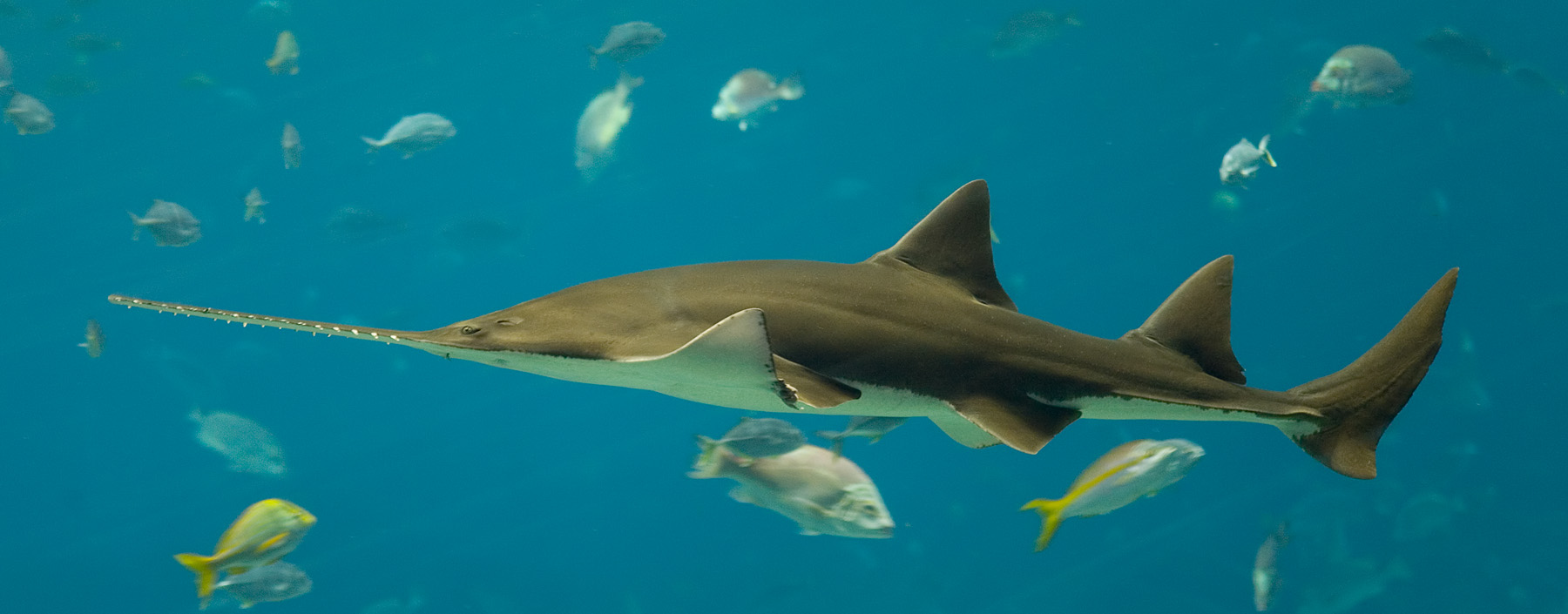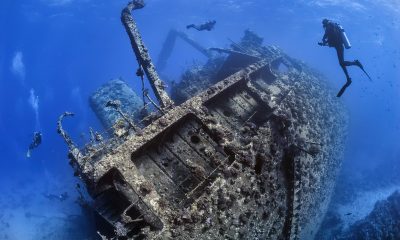News
Clean Sweep For Sharks And Rays At CMS CoP11
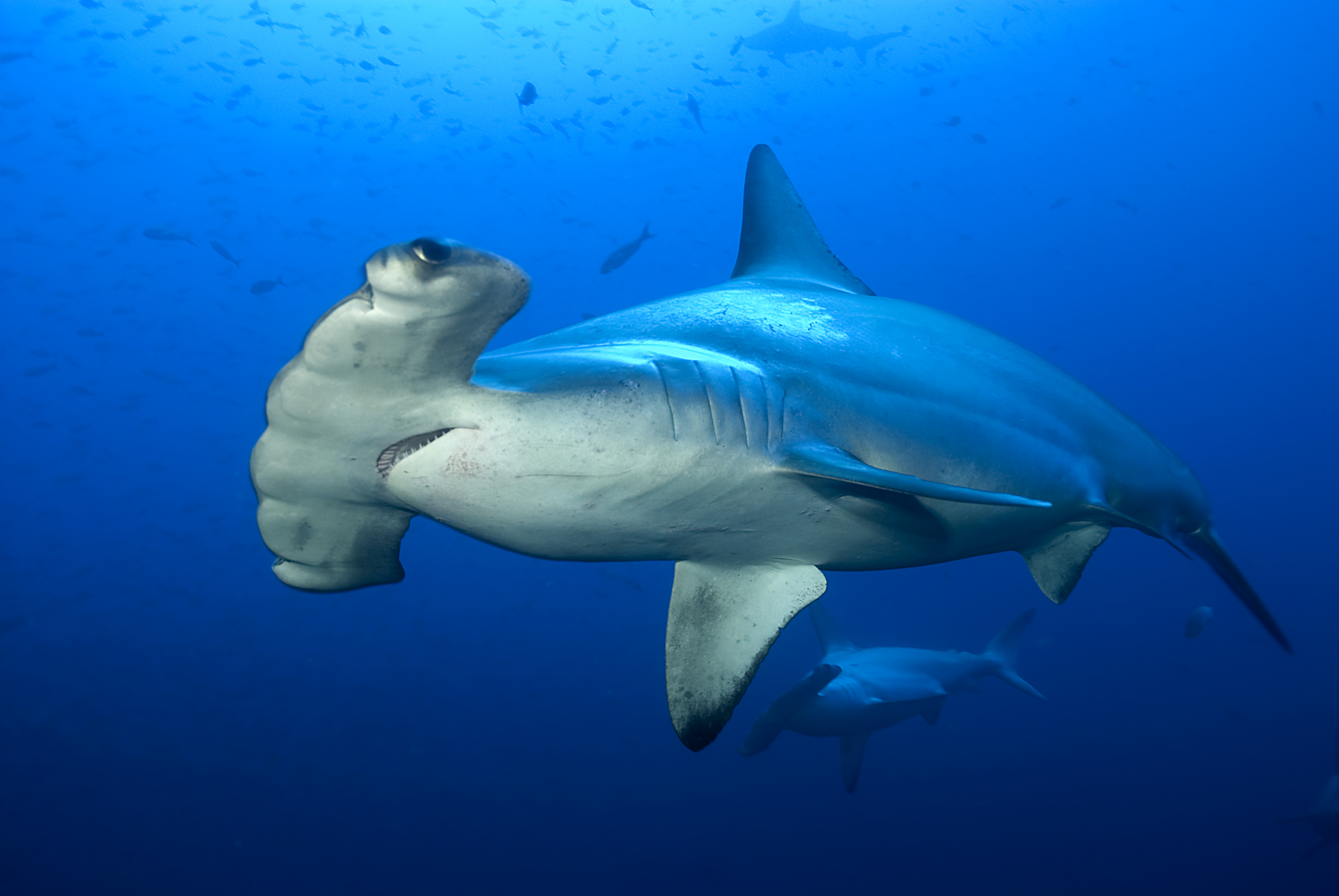
Parties from the UN conservation convention unanimously vote 21 species of threatened sharks and rays into the appendices of CMS
Quito, Ecuador November 9th 2014: Convention of Migratory Species of Wild Animals
Global momentum for elasmobranch conservation continued with a clean sweep at the CMS Conference of the Parties (CoP) in Quito, Ecuador yesterday, as all 21 proposed species of threatened sharks and rays were successfully listed on the appendices of CMS (CMS is an intergovernmental treaty under the United Nations Environment Program. CMS CoPs take place every 3 years).
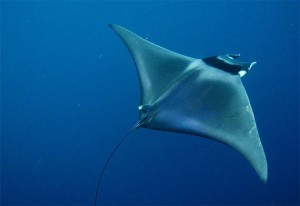 In summary, all five sawfish species, all nine species of Mobula (devil rays), and the reef manta ray have been listed successfully on Appendix I & II, which should bring about stricter protections for these species globally. Two species of hammerheads (the great & scalloped), all three thresher shark species (the bigeye, common and pelagic), and the silky shark have been awarded CMS Appendix II listing, which should encourage increased regional cooperation for their conservation.
In summary, all five sawfish species, all nine species of Mobula (devil rays), and the reef manta ray have been listed successfully on Appendix I & II, which should bring about stricter protections for these species globally. Two species of hammerheads (the great & scalloped), all three thresher shark species (the bigeye, common and pelagic), and the silky shark have been awarded CMS Appendix II listing, which should encourage increased regional cooperation for their conservation.
The Marine Megafauna Foundation is particularly delighted about the inclusion of sawfish, the world’s most endangered marine fish and of course the reef manta ray, which was overlooked in the 2011 proposal to list the giant manta ray on CMS.
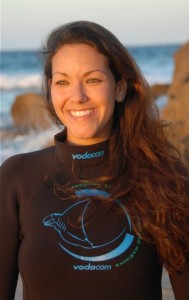 “This is another tremendous success for the rays,” gushed Dr. Andrea Marshall, director of the Marine Megafauna Foundation. “These CMS listings were sorely needed to help secure increased protection and management for these incredibly threatened species which are declining at alarming rates.”
“This is another tremendous success for the rays,” gushed Dr. Andrea Marshall, director of the Marine Megafauna Foundation. “These CMS listings were sorely needed to help secure increased protection and management for these incredibly threatened species which are declining at alarming rates.”
Marshall, who made a passionate intervention before the Parties on behalf of MMF and a collation of NGOs last Thursday, is the principal scientist for MMF’s Global Manta Ray Program and has been actively collecting data to support the proposal for Manta alfredi for years. She and her research team have conducted peer-reviewed scientific studies on three different continents demonstrating the highly mobile nature of this species in the lead up to CMS CoP11.
MMF scientists had already helped show that manta rays are amongst the least fecund of all shark and ray species with extremely conservative life history traits, most notably their small litter size. Low productivity species are highly vulnerable to human pressures, particularly fishing, one of the main reasons they are listed as vulnerable to extinction on the IUCN redlist of endangered species. However, to be eligible for a CMS listing, there needed to be evidence that the reef manta ray is also a migratory species in need of regional conservation efforts.
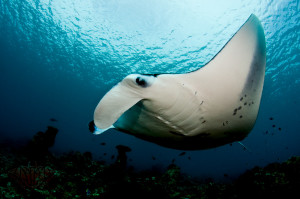 The MMF say they have been extremely concerned about the reef manta since their team documented a swift and significant 88% decline in observational sighting records of Manta alfredi at one of the most important aggregation areas for this species in the Indian Ocean. This local artisanal fishery for reef mantas in Mozambique predominantly uses resulting products domestically and operates at a much smaller scale than more organized fisheries for manta rays being monitored other parts of the globe. The implications of this study should be obvious and show the swift and devastating effects even small-scale fisheries can have on even relatively large populations of this species.
The MMF say they have been extremely concerned about the reef manta since their team documented a swift and significant 88% decline in observational sighting records of Manta alfredi at one of the most important aggregation areas for this species in the Indian Ocean. This local artisanal fishery for reef mantas in Mozambique predominantly uses resulting products domestically and operates at a much smaller scale than more organized fisheries for manta rays being monitored other parts of the globe. The implications of this study should be obvious and show the swift and devastating effects even small-scale fisheries can have on even relatively large populations of this species.
While international trade issues have been recently addressed with an Appendix II listing on CITES, domestic harvesting of Manta alfredi within range states is still an issue that threatens the survival of the species. This CMS listing will now encourage its protection within range states, prompt better management of populations and help to facilitate much needed research.
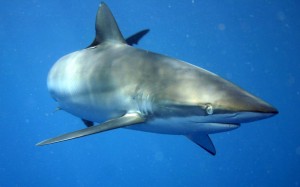 Across the world NGOs* have been voicing their opposition to unsustainable fisheries for sharks and rays, highlighting that these charismatic species would be much better used as drawcards for marine tourism, an ever-expanding and very lucrative industry that profits a wider variety of stakeholders and returns and expands the opportunity for continued profit to the countries where these species reside or frequent. Current estimates place global revenues from manta ray related tourism at close to $140 million US dollars annually.
Across the world NGOs* have been voicing their opposition to unsustainable fisheries for sharks and rays, highlighting that these charismatic species would be much better used as drawcards for marine tourism, an ever-expanding and very lucrative industry that profits a wider variety of stakeholders and returns and expands the opportunity for continued profit to the countries where these species reside or frequent. Current estimates place global revenues from manta ray related tourism at close to $140 million US dollars annually.
Manta rays cannot afford to be exploited and MMF have commended Fiji for sponsoring this proposal and Ecuador, the host country, for paving the way for global manta conservation in recent years.
“This is a major win for sharks and rays,” said Dr. Marshall. “these timely listings will go a long way to ensure that these species do not go extinct in the wild.”
To find out more about the MMF visit www.marinemegafauna.org.
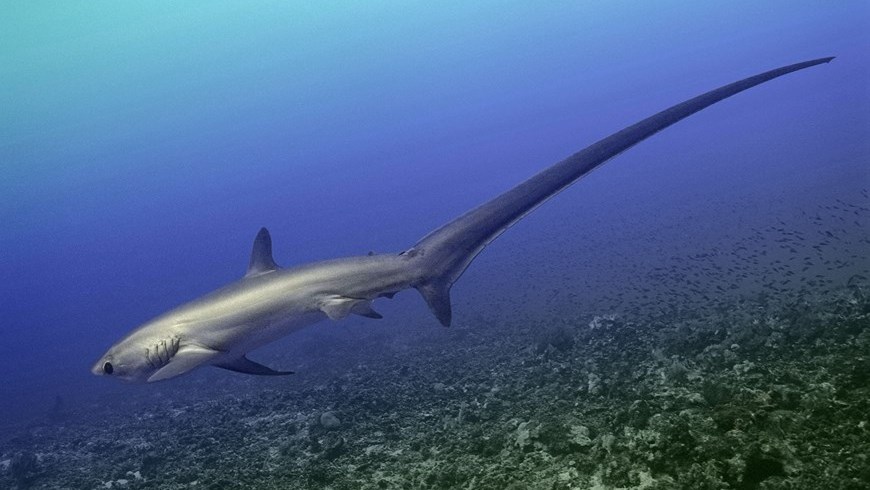 *In addition to the MMF, other NGOs actively supporting shark & ray proposals at CoP11 also included Shark Advocates International, Humane Society International, Project AWARE Foundation, Wildlife Conservation Society, PEW, Manta Trust, International Fund for Animal Welfare, & Pretoma.
*In addition to the MMF, other NGOs actively supporting shark & ray proposals at CoP11 also included Shark Advocates International, Humane Society International, Project AWARE Foundation, Wildlife Conservation Society, PEW, Manta Trust, International Fund for Animal Welfare, & Pretoma.
Gear News
Introducing the TR-80, IR-50 and CS-30 Regulators from DYNAMICNORD

Whether you are a beginner or a professional diver – with the three new main regulators from DYNAMICNORD, everyone will find their favourite regulator. They all look super stylish.
Excellent performance with the TR-80
Quality and performance are the be-all and end-all for regulators. It is not for nothing that the TR stands for Tec Reg. The innovative design of the TR-80 guarantees absolute reliability – even in ice-cold waters.

Perfect breathing effort at 0.8 J/l / certified for diving in waters below 10 degrees / structural design made of solid brass for best cold protection / membrane-compensated design with dry seal of the first stage / reduced exhalation effort thanks to optimized exhalation membrane and bubble deflector / adjustable Venturi (dive/predive) and adjustment knob for individual inhalation comfort / innovative design of the front cover prevents free-flow in strong currents or when diving with scooters / design made of sandblasted brass, matt chrome finish / 2 HP and 4 LP outlets / mouthpiece made of high-quality, anti-allergic silicone for maximum comfort.


Amazing underwater adventures with the IR-50
The IR-50 is the top regulator for advanced and experienced divers. Natural breathing is the essence of this regulator.

Ideal breathing effort at 0.8 J/l /certified for diving in waters below 10 degrees / compensated membrane / adjustable venturi (dive/predive) and adjustment knob for individual inhalation comfort/ outlet valve and deflector for minimum exhalation effort and reduction of bubbles on the face / design made of sandblasted brass, matt chrome finish / 2 HP and 4 NP outlets / mouthpiece made of high-quality, anti-allergic silicone for maximum comfort.


The Workhorse – our CS-30
For diving centres and diving beginners – the workhorse stands for strong construction, reliability and robustness. Perfect for your training.

Optimal breathing effort at 0.8 J/l /recommended for diving in waters above 10 degrees / non-compensated piston / adjustable venturi (dive/predive) / outlet valve and deflector for minimum exhalation effort and reduction of bubbles on the face / design made of sandblasted brass, matt chrome finish / 1 HP and 3 NP outlets / mouthpiece made of high-quality, anti-allergic silicone for maximum comfort.


Octopus OP-30
The OP-30 is the ideal addition to all DYNAMICNORD regulators. It is identical in construction to the CS-30.

The TR-80, IR-50, CS-30 (DIN & INT) regulators and the Octopus OP-30 are available from DYNAMICNORD dealers and in the online store.
DYNAMICNORD – Your Outdoor Companion.
Marine Life & Conservation
Paul Watson Released as Denmark Blocks Japan’s Extradition Bid

Renowned anti-whaling activist Paul Watson has been released from custody in Greenland after spending five months in detention. Denmark’s Justice Ministry rejected Japan’s request for his extradition, citing insufficient guarantees that his time already served in custody would be credited against any potential sentence.
The 74-year-old Canadian-American was arrested on July 21 in Nuuk, Greenland’s capital, when his ship docked to refuel. His arrest was based on a 2012 Japanese warrant related to a 2010 encounter in Antarctic waters. Japan alleged Watson obstructed operations and caused damage to a whaling research ship during efforts to disrupt illegal whaling. Watson has consistently denied these claims, maintaining his commitment to marine conservation.
Denmark, which oversees extradition matters for Greenland, concluded that while the legal conditions for extradition were met, the lack of assurances from Japan regarding time-served credit made extradition untenable.
In a video shared by his foundation, Watson expressed gratitude and relief, saying, “After five months, it’s good to be out… and good to know they’re not sending me to Japan.” He added that the most difficult part of his time in custody was being separated from his two young sons.
Watson is a pioneering figure in marine conservation, known for founding the Captain Paul Watson Foundation in 2022 after decades of activism with the Sea Shepherd Conservation Society. His bold efforts to defend marine life have earned him widespread support, including from celebrities and conservationists. His work has also been featured in the acclaimed reality TV series Whale Wars.
Watson’s lawyer, Jonas Christoffersen, praised the decision, stating, “We are happy and relieved that Paul Watson is now free.” He added that Watson is eager to reunite with his family and continue his vital work.
The arrest occurred while Watson’s vessel, the M/Y John Paul DeJoria, was en route to the North Pacific with a team of 26 volunteers to intercept a Japanese whaling ship. His foundation described the arrest as politically motivated and emphasized that Watson’s actions were focused on ending illegal whaling practices.
Japan resumed commercial whaling in 2019 after leaving the International Whaling Commission, asserting that whale meat is a cultural tradition. Conservationists, however, continue to challenge these practices, highlighting their impact on marine ecosystems.
Despite the challenges, Watson remains steadfast in his mission to protect marine life and bring attention to whaling practices. His dedication to ocean conservation has made him a globally respected advocate for the environment.
-

 News2 months ago
News2 months agoIconic SS United States to become the World’s Largest Artificial Reef
-

 News3 months ago
News3 months agoBook Review – 52 Assignments: Underwater Photography
-

 Gear News3 months ago
Gear News3 months agoDYNAMICNORD – New German diving brand enters the British market
-

 News3 months ago
News3 months agoExploring Cenote El Pit: A Diver’s Dream
-

 Gear News3 months ago
Gear News3 months agoTry BARE drysuits (and maybe even win one!) this Friday with Sea & Sea at North West Dive Fest
-

 Marine Life & Conservation3 months ago
Marine Life & Conservation3 months agoBook Review: Coral Triangle Cameos
-

 Blogs2 months ago
Blogs2 months agoDive the Egyptian Red Sea this Autumn with Regaldive
-

 News3 months ago
News3 months ago2024 Ocean Art Underwater Photo Competition Announced



